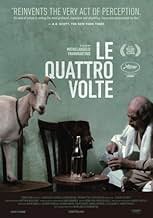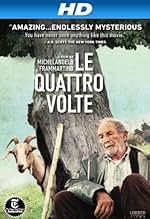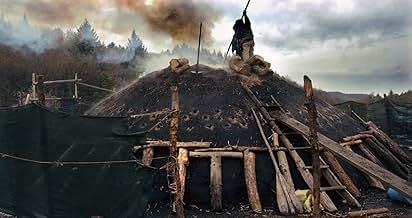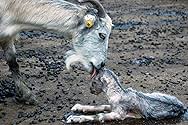VALUTAZIONE IMDb
7,2/10
4417
LA TUA VALUTAZIONE
Un vecchio pastore vive i suoi ultimi giorni in un tranquillo borgo medievale arroccato sulle colline della Calabria, all'estremità meridionale d'Italia. Sopravvive con le capre abbandonate ... Leggi tuttoUn vecchio pastore vive i suoi ultimi giorni in un tranquillo borgo medievale arroccato sulle colline della Calabria, all'estremità meridionale d'Italia. Sopravvive con le capre abbandonate molto tempo fa per gli abitanti del villaggio.Un vecchio pastore vive i suoi ultimi giorni in un tranquillo borgo medievale arroccato sulle colline della Calabria, all'estremità meridionale d'Italia. Sopravvive con le capre abbandonate molto tempo fa per gli abitanti del villaggio.
- Regia
- Sceneggiatura
- Star
- Premi
- 14 vittorie e 14 candidature totali
Recensioni in evidenza
"O Lord, you have seduced me, and I was seduced." This, the central sentiment expressed by the Carthusian monks of the Grande Chartreuse monastery in "The Great Silence" (2005), was also how I felt on leaving "Le Quattro Volte" (2010).
As with "The Great Silence," one of the most striking features of "Le Quattro Volte" (The Four Times) is its lack of dialogue. However, whereas for some individuals the 169 minutes of near silence in "The Great Silence" was overly taxing, in this shorter, more widely focused film - quietly reflecting aspects of life in an isolated village in Calabria – the Milanese director Michelangelo Frammartino has given us a predominantly visual poem of place, of space, of people and of the passing of time.
Although not overly religious, it is a spiritually orientated film in which we are asked to consider Pythagoras' contention that we must each know ourselves four times due to the fact that we "have four lives within us - the mineral, the vegetable, the animal and the human".
Therefore within its 88 minute run the small number of central human characters that are featured within it are soon relegated to positions of equality, or of equal vulnerability, before nature. Thus, for example, the goat-herder's animals soon come to the forefront of the film, as do other elements of the animal, vegetable and mineral kingdoms, in order to declare – seemingly – that these other realms also warrant serious and respectful consideration.
An extremely enjoyable and far-from-always-serious film, I found this a beautifully filmed, calming and thought-provoking movie.
As with "The Great Silence," one of the most striking features of "Le Quattro Volte" (The Four Times) is its lack of dialogue. However, whereas for some individuals the 169 minutes of near silence in "The Great Silence" was overly taxing, in this shorter, more widely focused film - quietly reflecting aspects of life in an isolated village in Calabria – the Milanese director Michelangelo Frammartino has given us a predominantly visual poem of place, of space, of people and of the passing of time.
Although not overly religious, it is a spiritually orientated film in which we are asked to consider Pythagoras' contention that we must each know ourselves four times due to the fact that we "have four lives within us - the mineral, the vegetable, the animal and the human".
Therefore within its 88 minute run the small number of central human characters that are featured within it are soon relegated to positions of equality, or of equal vulnerability, before nature. Thus, for example, the goat-herder's animals soon come to the forefront of the film, as do other elements of the animal, vegetable and mineral kingdoms, in order to declare – seemingly – that these other realms also warrant serious and respectful consideration.
An extremely enjoyable and far-from-always-serious film, I found this a beautifully filmed, calming and thought-provoking movie.
Le Quattro Volte is the essence of fine film making, of film making as art that does not need to rely on technological camouflage to tell an engrossing human story. Who needs violence, car chases, explosions, and overwhelming special effects when there are films like this to be seen? If you have ever spent just a single day allowing yourself to be totally absorbed into a small, isolated town (this one just happens to be in the hills of southern Italy), this film will evoke visceral feelings from deep within you of recollection, pathos, and respect for tradition and simple human dignity. With practically no dialog, it is a visual tone poem that speaks volumes about the nature, pace, toils, loneliness, and devotion to ritual of small, traditional communities everywhere.
I went to see this movie at Renoir-Curzon in central London last bank Monday.
I was with two friends of mine: another Calabrian and a Sicilian. I invited them telling the movie was shot in Calabria, but I was worried the plot wouldn't interest them.
I was wrong, this movie astonished the three of us completely: I was not only fascinated by the beautiful views of the Calabrian countryside, but the idea of mixing philosophic concepts with very basic, rural and remote communities still sticks in my mind.
"Le quattro volte" means "the four times" and the movie gives an interpretation of Pythagoras (who taught and settled in Calabria in the 6th century BC) concept of four successive lives that each of us holds: mineral, vegetable, animal and human.
In the movie there are all the elements of this concept shown in a very poetic and amusing way: we have an old goatherd as human, a kidskin as animal, a tree as vegetable and coal (carbon) as mineral. All connected in a cycle of life and death to symbolise the re-incarnation.
The sound of nature and rural human activities is the soundtrack of the movie, it makes us understand we, as human beings, are not at the centre of the universe, we should be aware of the elements we are part of and live in harmony with them.
All this makes Le Quattro volte an absolute masterpiece: 10/10
I was with two friends of mine: another Calabrian and a Sicilian. I invited them telling the movie was shot in Calabria, but I was worried the plot wouldn't interest them.
I was wrong, this movie astonished the three of us completely: I was not only fascinated by the beautiful views of the Calabrian countryside, but the idea of mixing philosophic concepts with very basic, rural and remote communities still sticks in my mind.
"Le quattro volte" means "the four times" and the movie gives an interpretation of Pythagoras (who taught and settled in Calabria in the 6th century BC) concept of four successive lives that each of us holds: mineral, vegetable, animal and human.
In the movie there are all the elements of this concept shown in a very poetic and amusing way: we have an old goatherd as human, a kidskin as animal, a tree as vegetable and coal (carbon) as mineral. All connected in a cycle of life and death to symbolise the re-incarnation.
The sound of nature and rural human activities is the soundtrack of the movie, it makes us understand we, as human beings, are not at the centre of the universe, we should be aware of the elements we are part of and live in harmony with them.
All this makes Le Quattro volte an absolute masterpiece: 10/10
I saw this film in Norway where it recently came out in the cinemas.
The title refers to the four seasons and the story follows a cycle of birth, death and rebirth. There is a symmetry in the film, and each part focuses on the fate of one individual (a farmer, a goat and a tree, for instance).
The film makes effective use of the beautiful landscape of Calabria, and the old, ramshackle village. The setting is perhaps in itself the main character of the film. Humans are often viewed from above, and we are in a sense getting the "God" treatment.
There is barely any plot or a story to speak of, yet we go through stages of life that are eternal and inevitable - and we are reminded again and again that all things must pass.
There are life-like documentary aspects to this feature. The film is shot in available light with amateur actors and animals that will endear you. The result is breathtaking and inspiring. The sound scape is also rich: it helps create an emotional journey through every chapter of the film.
I can highly recommend this to anyone interested in unusual films with no dialogue or discernible plot, but anyone also will no doubt be captivated by it's gorgeous setting, it's humble characters or the feeling of watching life pass, unfiltered.
The title refers to the four seasons and the story follows a cycle of birth, death and rebirth. There is a symmetry in the film, and each part focuses on the fate of one individual (a farmer, a goat and a tree, for instance).
The film makes effective use of the beautiful landscape of Calabria, and the old, ramshackle village. The setting is perhaps in itself the main character of the film. Humans are often viewed from above, and we are in a sense getting the "God" treatment.
There is barely any plot or a story to speak of, yet we go through stages of life that are eternal and inevitable - and we are reminded again and again that all things must pass.
There are life-like documentary aspects to this feature. The film is shot in available light with amateur actors and animals that will endear you. The result is breathtaking and inspiring. The sound scape is also rich: it helps create an emotional journey through every chapter of the film.
I can highly recommend this to anyone interested in unusual films with no dialogue or discernible plot, but anyone also will no doubt be captivated by it's gorgeous setting, it's humble characters or the feeling of watching life pass, unfiltered.
Would that life in life in an isolated village in Calabria, or any other place be as beautiful and silent.
There was not one word of dialog in the film. The only utterances was the dog barking and the sheep bleating.
An old man dies and presumably is reborn as a goat. The goat dies and it subsumed into a tree. The tree becomes charcoal, a mineral and dust.
Dust thou art and to dust thy shall return.
Matter is neither created nor destroyed.
Pick your interpretation.
It was a film to contemplate. It was full of Christian imagery, but it also stimulates mediation.
Not for everybody, but it was a beautiful film.
There was not one word of dialog in the film. The only utterances was the dog barking and the sheep bleating.
An old man dies and presumably is reborn as a goat. The goat dies and it subsumed into a tree. The tree becomes charcoal, a mineral and dust.
Dust thou art and to dust thy shall return.
Matter is neither created nor destroyed.
Pick your interpretation.
It was a film to contemplate. It was full of Christian imagery, but it also stimulates mediation.
Not for everybody, but it was a beautiful film.
Lo sapevi?
- QuizThe film is comprised of long takes. One of them lasts an astounding 8 minutes.
- Curiosità sui creditiThe end credits also include a silver fir, the goats of Caulonia and the coal of Calabria among the cast members.
- ConnessioniFeatured in Ebert Presents: At the Movies: Episodio #1.15 (2011)
I più visti
Accedi per valutare e creare un elenco di titoli salvati per ottenere consigli personalizzati
- How long is Le Quattro Volte?Powered by Alexa
Dettagli
- Data di uscita
- Paesi di origine
- Sito ufficiale
- Lingua
- Celebre anche come
- Le Quattro Volte
- Luoghi delle riprese
- Aziende produttrici
- Vedi altri crediti dell’azienda su IMDbPro
Botteghino
- Lordo Stati Uniti e Canada
- 152.530 USD
- Fine settimana di apertura Stati Uniti e Canada
- 16.192 USD
- 3 apr 2011
- Lordo in tutto il mondo
- 717.918 USD
- Tempo di esecuzione
- 1h 28min(88 min)
- Colore
- Mix di suoni
- Proporzioni
- 1.85 : 1
Contribuisci a questa pagina
Suggerisci una modifica o aggiungi i contenuti mancanti






















